If you need an excuse to spend a day in the charming seaside town of Whitstable, the Biennale is it. After a four-year hiatus, the festival is back with a somewhat edgy, apocalyptic feel.
For instance, Webb/Ellis’ film This Place is a Message (St John’s Methodist Chapel, pictured below) features a group of teenagers hanging out in a disused chalk quarry in a part of the country long listed for the burial of nuclear waste. What symbol would they choose to warn future generations of the presence of this hazardous residue?
It’s a bit like a philosophy class that includes communicating with beings thousands of years hence, understanding past civilisations and pondering the importance of language to human survival. It could have been terribly worthy, but thanks to imaginative camerawork and the help of Phil Minton (of the Feral Choir) with whom the students explore non-verbal communication – chirping, whooping, hissing and whistling – the film is remarkably beguiling. This is what school should be like!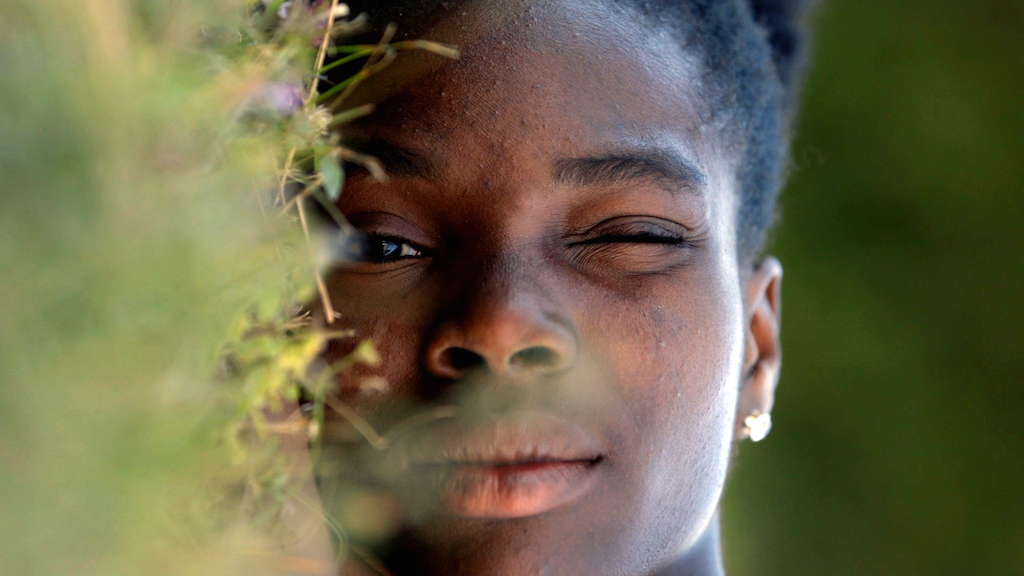 The festival includes 60 artists and poets under the theme Afterwardness, a term devised by Freud to describe the process of reviewing past events. Mimi Khalvati borrowed it for the title of her book of sonnets, one of which is written large along the harbour. Integrating the work into the fabric of the town was key, so a poem by Dzifa Benson, curator of the poetry section, is revealed as the tide recedes from the wooden jetty; others are written on the West Quay, the walls of the Old Bank and the Horsebridge Arts Centre (pictured below: "REseeding", in correspondence by Jade Montserrat and Webb-Ellis), on shop windows and on the paper wrapping your fish and chips and ice cream cones.
The festival includes 60 artists and poets under the theme Afterwardness, a term devised by Freud to describe the process of reviewing past events. Mimi Khalvati borrowed it for the title of her book of sonnets, one of which is written large along the harbour. Integrating the work into the fabric of the town was key, so a poem by Dzifa Benson, curator of the poetry section, is revealed as the tide recedes from the wooden jetty; others are written on the West Quay, the walls of the Old Bank and the Horsebridge Arts Centre (pictured below: "REseeding", in correspondence by Jade Montserrat and Webb-Ellis), on shop windows and on the paper wrapping your fish and chips and ice cream cones.
Jennet Thomas’ film The Great Curdling (the Old Bank, main picture) takes a leap into a post-apocalyptic future. Animals are extinct and the sea is dead. Cooking has been banned and everyone is fed a creamy mush delivered in little boxes, Amazon-style, by drones. But mutant crustacea washed up on the beach herald a resurgence. They bring tiny beads that open into glad hands anticipating rebirth. The cast includes a singing school teacher, a former surgeon and the Curdles, a crew of weirdos sporting crab-claw head gear. And to top off this operatic mix of tragedy and comedy, the Curdles will perform a Musical Sermon on Whitstable Harbour at 2pm on Saturday 18 June.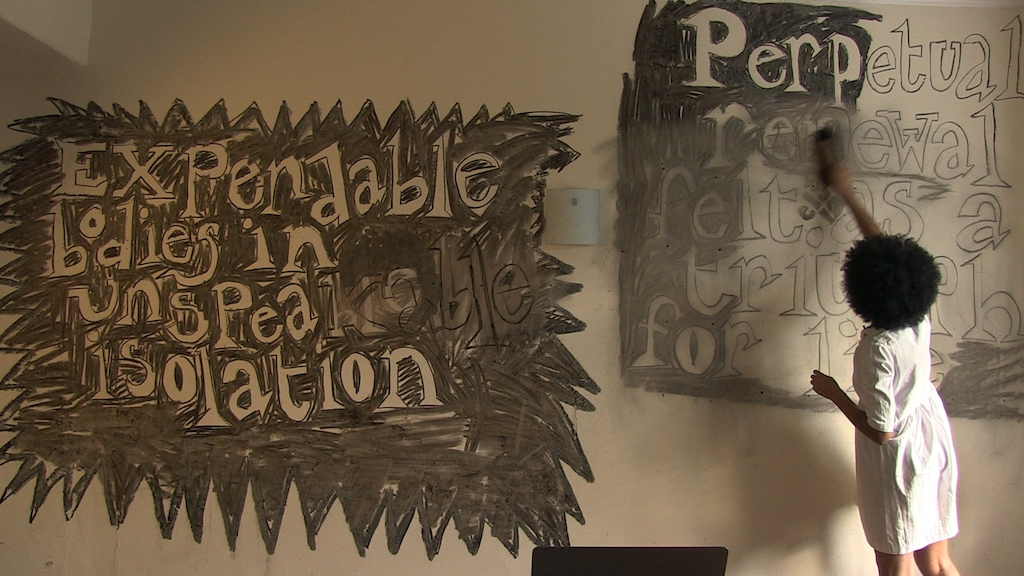 Alicia Radage’s installation Mother Bent (Library Lecture Hall) is similarly unsettling. Dotted over islands of soil are dozens of casts of breasts. Protruding from the nipples are metal rods bearing casts of ears and crab claws. On screens nestling in the earth are videos of worms burrowing into soil and wriggling on flesh, while naked buttocks gyrate suggestively and the artist swallows dirt. The inhuman sounds of her rewilded voice add to the creepy atmosphere while, on another screen, she stands, eyes closed and arms outstretched as if in crucifixion, asking, “When does it all come crashing down and how far can I fall?”
Alicia Radage’s installation Mother Bent (Library Lecture Hall) is similarly unsettling. Dotted over islands of soil are dozens of casts of breasts. Protruding from the nipples are metal rods bearing casts of ears and crab claws. On screens nestling in the earth are videos of worms burrowing into soil and wriggling on flesh, while naked buttocks gyrate suggestively and the artist swallows dirt. The inhuman sounds of her rewilded voice add to the creepy atmosphere while, on another screen, she stands, eyes closed and arms outstretched as if in crucifixion, asking, “When does it all come crashing down and how far can I fall?”
Pick up a programme and map of the five venues and 16 locations around Whitstable and further afield at Seasalter and Queenborough. And be sure to take the boat trip to the wind farm and Red Sands Fort, a series of towers built in WWII and used in the 1960s as a pirate radio station. On board you can listen to Madeleine Ruggi meditating on the wind and its importance to us over the centuries – an exhilarating fusion of art and the elements.
- The Whitstable Biennale continues until Sunday 19 June
- More visual arts reviews on theartsdesk

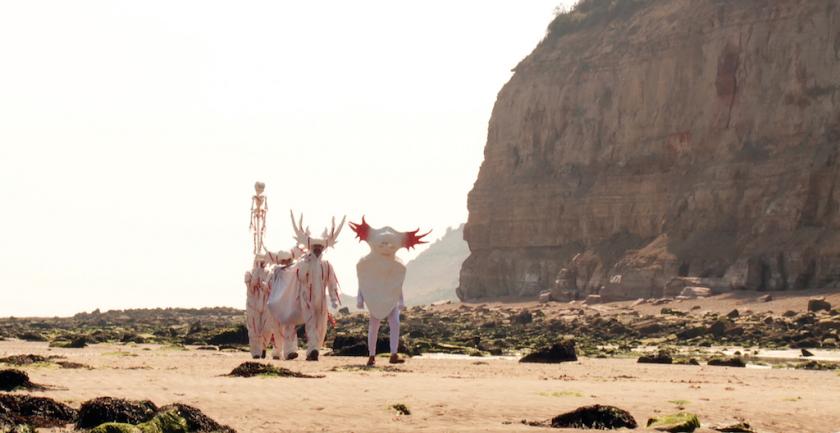



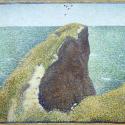


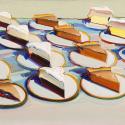



![SEX MONEY RACE RELIGION [2016] by Gilbert and George. Installation shot of Gilbert & George 21ST CENTURY PICTURES Hayward Gallery](/sites/default/files/styles/thumbnail_125_x_125_/public/mastimages/Gilbert%20%26%20George_%2021ST%20CENTURY%20PICTURES.%20SEX%20MONEY%20RACE%20RELIGION%20%5B2016%5D.%20Photo_%20Mark%20Blower.%20Courtesy%20of%20the%20Gilbert%20%26%20George%20and%20the%20Hayward%20Gallery._0.jpg?itok=3oW-Y84i)
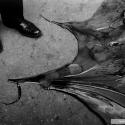
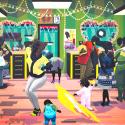
Add comment